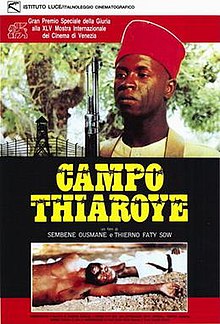Camp de Thiaroye
| Camp de Thiaroye | |
|---|---|
 | |
| Directed by | Ousmane Sembène Thierno Faty Sow |
| Written by | Ousmane Sembène Thierno Faty Sow |
| Produced by | Mustafa Ben Jemja Ouzid Dahmane Mamadou Mbengue |
| Cinematography | Smaïl Lakhdar-Hamina |
| Edited by | Kahéna Attia |
| Music by | Ismaël Lô |
Production companies | Enaproc Filmi Domirev Films Kajoor Satpec Société Nouvelle Pathé Cinéma |
| Distributed by | New Yorker Films |
Release date |
|
Running time | 157 minutes |
| Country | Senegal |
| Languages |
|
Camp de Thiaroye ([kɑ̃ də tjaʁ.wa]; also known as The Camp at Thiaroye) is a 1988 Senegalese war-drama film written and directed by Ousmane Sembène and Thierno Faty Sow.
The film entered the competition at the 45th Venice International Film Festival, in which it won the Grand Jury Prize.[1] The film depicts the Thiaroye massacre, which happened in Thiaroye, Dakar, in 1944.
The film is about the mutiny by and mass killing of French West African troops by French forces on the night of November 30 to December 1, 1944. West African conscripts were protesting poor conditions and revocation of pay at the Thiaroye camp. The film is a criticism and indictment of the French colonial system.[2]
The film documents the events leading up to the Thiaroye massacre, as well as the massacre itself. The film received positive reviews at the time it was released and continues to be heralded by scholars as an important historical documentation of the Thiaroye massacre.[3][4]
The film was banned in France for a decade and censored in Senegal as well.[5]
Plot summary
[edit]A Senegalese platoon of soldiers from the French Free Army are returned from combat in France and held for a temporary time in a military encampment with barbed wire fences and guard towers in the desert. Among their numbers are Sergeant Diatta, the charismatic leader of the troop who was educated in Paris and has a French wife and child, and Pays, a Senegalese soldier left in a state of shock from the war and concentration camps and who can only speak in guttural screams and grunts.
All is well until the soldiers start to complain about the food offered in the camp, to which the French commander says he will do nothing about, as meat is reserved for white officers. To kill time, Sergeant Diatta goes into town to find a brothel, and is thrown out of one because he is African; he is subsequently found by American troops, who beat and capture him. As revenge, the Senegalese troops capture a white American soldier and an exchange is made between the two prisoners, and the Americans threaten to level the camp and kill everyone.
As the Senegalese troops are about to be transferred out of the camp, they learn they will only be given half the pay for their service as the French troops are unfairly converting French francs to Senegalese francs at half the rate to save money. The Senegalese troops capture the camp and take a French general hostage, beginning a mutiny. The mutiny ends when the officer gives them his word that they will be given their proper pay. That night, they dance and celebrate. At about 3 am, Pays is in a watch tower and sees tanks approaching the camp, and wakes up the other soldiers, but is unable to tell them what is happening; they think he is saying that Nazis are invading the camp, and dismiss him as being crazy. An hour or so later, the French tanks open fire on the camp, killing Diatta, Pays and the rest of the Senegalese platoon.
Cast
[edit]- Sidiki Bakaba
- Hamed Camara
- Ismaël Lô
- Philippe Chamelat
- Marthe Mercadier
- Casimir Zoba, aka Zao
- Jean-Daniel Simon
Release
[edit]A restored version of the film was screened at the MAMI Mumbai Film Festival 2024 under the Restored Classics section.[6]
See also
[edit]References
[edit]- ^ Lancia, Enrico (1998). I Premi del Cinema: 1927–1997 (in Italian). Rome: Gremese. ISBN 8877422211.
- ^ "Camp De Thiaroye". African Film Library. Archived from the original on 18 August 2012. Retrieved 9 December 2014.
- ^ Ngugi, Njeri (June 2003). "Presenting and (Mis)representing History in Fiction Film: Sembène's 'Camp de Thiaroye and Attenborough's 'Cry Freedom'". Journal of African Cultural Studies. 16 (1): 57–68. doi:10.1080/1369681032000169267. JSTOR 3181385. S2CID 191490169.
- ^ Kempley, Rita (1 March 1991). "From Africa, A 'Camp' of Tragic Heroes". The Washington Post.
- ^ Haque, Nicolas (12 November 2013). "A little-known massacre in Senegal". Al-Jazeera. Archived from the original on 16 November 2013. Retrieved 22 May 2023.
- ^ Deb, Deepshikha (2024-09-30). "MAMI Mumbai Film Festival Unveils 2024 Official Lineup". High On Films. Retrieved 2024-10-18.
External links
[edit]- 1988 films
- Films directed by Ousmane Sembène
- World War II films based on actual events
- Films set in the French colonial empire
- Films set in Senegal
- Film censorship in France
- English-language Senegalese films
- 1980s French-language films
- Wolof-language films
- 1988 drama films
- 1980s war drama films
- Venice Grand Jury Prize winners
- Works about France in World War II
